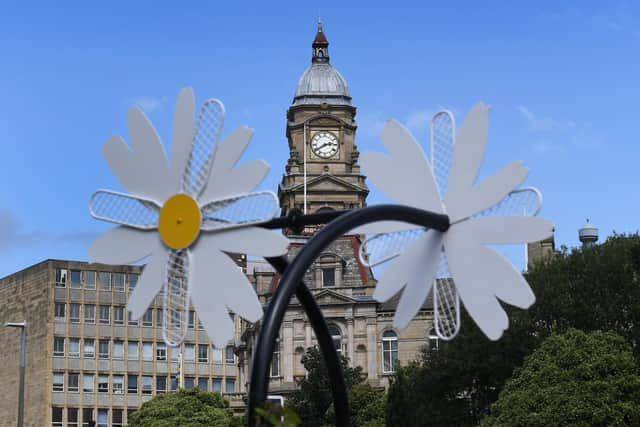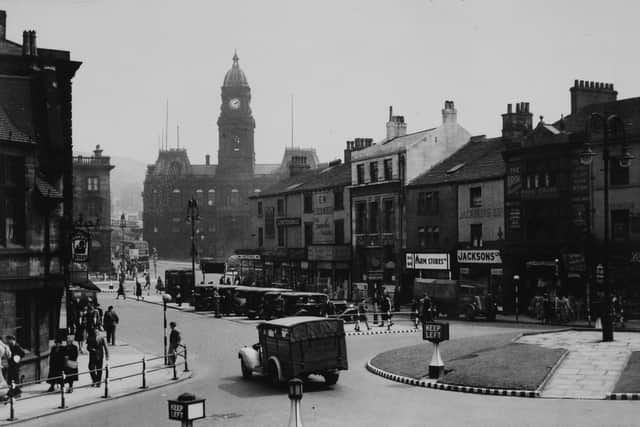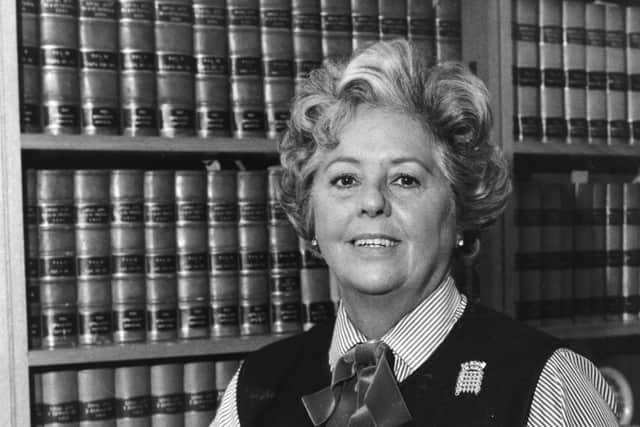From the Industrial Revolution to Betty Boothroyd, how Dewsbury has left its mark on the world
The first was the size and design of their town hall, and the second was the scale of the open spaces and the leisure pursuits they contained.
Councillors and aldermen could proudly point to their generous provision for the masses, and Dewsbury is a prime exemplar.
Advertisement
Hide AdAdvertisement
Hide AdThe town started its journey into its glorious golden years when it became linked to the North’s rapidly-expanding canal network, which meant important connections to places like Hull and Manchester. This was 1770, and only a few years later, the population was around 4,500 – a figure that grew sharply during Queen Victoria’s reign.


Dewsbury established itself as one of the main producing centres for the shoddy and mungo industries, where old wool was mixed with old and then woven into heavier items. When it came to providing uniforms for the army and navy (this was a period of great expansion for the British Empire, remember) Dewsbury was up there among the best, and the town’s blankets travelled wherever the soldiers and sailors went.
By the time that incorporation as a municipal borough came along in 1862 it was clear that something suitably grand should be built to reflect the community’s role in the great Industrial Revolution.
The foundation stone for the town hall was laid in the autumn of 1886, and it opened three years later at a cost of £40,000. It was an ambitious project by any standards and as well as all the council offices and services, the site was also home to a concert hall (still popular today) the magistrate’s courts and police cells. It is rightly Grade II listed.
Advertisement
Hide AdAdvertisement
Hide AdIndustrial towns could, of course, be dirty, soot-ridden places, which is why green spaces became so important. Places like Crow Nest Park.


This area of town had been the site of a mansion since the 16th century, and it was offered to the Corporation by the last residents, the Hague family. They had, apparently, been wanting to “offload” their inheritance for some time, and they finally took the money for their 74 acres, and moved on in 1893. It’s another Grade II jewel in the town’s crown to this day.
Even further up the listings “charts” is the beautiful Dewsbury Minster, which is also Grade II listed. Part of it has been a place of worship since 1220, and there is archaeological evidence that the Anglo-Saxons also prayed hereabouts.
One notable curate was Patrick Brontë, father, of course, to a famous trio of talented sisters who blazed a trail in the literary firmament. Tragically, Patrick outlived them all. He was dismayed at the way that working class children received almost no schooling, and taught youngsters for hours on end at the Dewsbury Sunday School.
Advertisement
Hide AdAdvertisement
Hide AdAll Saints’ is also where one of Yorkshire’s oddest customs is observed. Every Christmas Eve, you’ll hear Black Tom, one of the peal of bells in the tower ring out. This year it will toll 2020 times – once for every year since Christ’s birth. It’s known as “The Devil’s Knell”, and it dates back to the 15th century, when Sir Thomas de Soothill murdered a servant boy in a fit of anger. We know the name of the penitent Thomas, but not his unfortunate victim.


There’s a show business story that tells you a lot about the business acumen of Jack Buchanan, a great star of stage and films and a theatre entrepreneur, and the down-to-earth Yorkshire pragmatism of a Dewsbury theatre manager. In the 1930s, one of the most popular shows was the live version of Goodnight Vienna. It had been a box office hit at movie palaces up and down the country for Buchanan and his young leading lady, Anna Neagle.
It featured as a BBC radio programme and then was adapted for the stage, heading out on tour. By the onset of the Second World War it came to the Dewsbury Empire, a handsome venue that could seat nearly 2,000 people. Buchanan made a habit of calling the management of every venue at least twice a week, to ask how the takings had been taken.
Legend has it that he rang the Dewsbury Empire and spoke to the manager, explaining that he had a production on called Goodnight Vienna. When he asked how it was doing, the manager replied: “About as bloody well as Goodnight Dewsbury would do in Vienna!”
Advertisement
Hide AdAdvertisement
Hide AdMuch can be gleaned about a town and its people from the theatres and cinemas it once supported. What went on screen, or on stage, gives you a flavour of the times, and the programmes of places like the Empire in Dewsbury were full of adverts for local businesses. Each has a story to tell.
The Empire had built up a formidable reputation for its home-grown, but lavish and top quality Christmas pantomimes. In a wartime production of Cinderella, the leggy lass playing Prince Charming was the wonderfully-named Doris Fishwick, in the title role was Ann Yorke, and Buttons was Teddy White.
More than 30 adverts were crammed onto the four sides of the 2d programme, including one for the Bickers department store which proclaimed that it was “The Shop with the Windows and the Bargains – see the former and buy the latter”, and another patriotic one from G O Armitage, the cycle and radio engineer on Huddersfield Road. He urged potential customers that “For real war-time emergency… Ride a Bicycle”.
Another advert was for The White Hart Inn, on Thornhill Road. Then it was a popular pub and now houses an Islamic prayer centre – quite a change in purpose, but still thriving.
Advertisement
Hide AdAdvertisement
Hide AdDewsbury has undoubtedly been through tough times, especially when traditional industries waned and long-standing businesses closed. The make-up of the town may have changed over the decades but there are regeneration schemes afoot and the town’s spirit endures. And no one embodies that spirit better than the indefatigable Betty Boothroyd.
Now 90, Baroness Boothroyd was born and studied in Dewsbury before going on to be a Tiller Girl, an MP, and then Speaker, and later a redoubtable member of the Upper Chamber.
She learned paragliding on holiday in her 60s and former Prime Minister John Major called her a national treasure. She, like the town she comes from, is made of strong stuff.
Support The Yorkshire Post and become a subscriber today.
Your subscription will help us to continue to bring quality news to the people of Yorkshire. In return, you'll see fewer ads on site, get free access to our app and receive exclusive members-only offers.
Advertisement
Hide AdAdvertisement
Hide AdSo, please - if you can - pay for our work. Just £5 per month is the starting point. If you think that which we are trying to achieve is worth more, you can pay us what you think we are worth. By doing so, you will be investing in something that is becoming increasingly rare. Independent journalism that cares less about right and left and more about right and wrong. Journalism you can trust.
Thank you
James Mitchinson